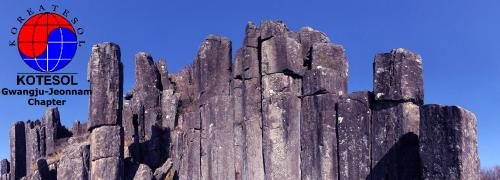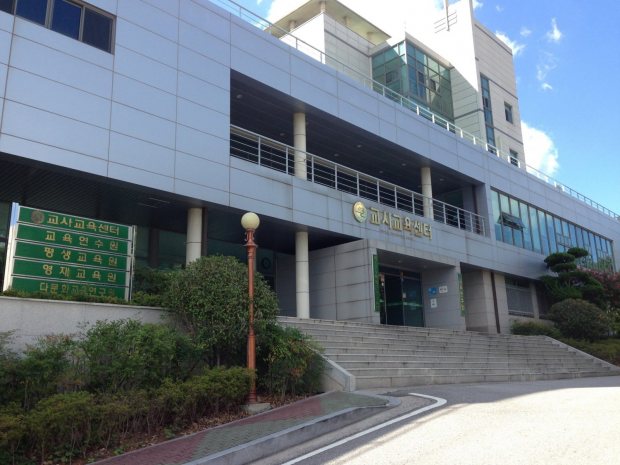
Gwangju-Jeonnam Chapter February Meeting
.
––– Morning Reflective Practice Session –––
Time: 11:00 am - 12:30 pm (Sat., Feb. 11)
Location: Kenya Espresso Cafe, near GNUE. (The 2nd building from GNUE main gate, towards E-mart. Map at bottom.)
ㅡ Topic: Caring in Our Teaching
ㅡ Facilitator: Jocelyn Wright
––– MAIN MEETING SCHEDULE –––
Time: Saturday, Feb. 11, 2017, 1:45 - 5:00 pm
Location: Gwangju National University of Education (GNUE), Teacher Training Center (교사교육센터) 1st Floor; Room 811. Detailed directions HERE.
1:45 pm: Sign-in and Meet-and-Greet (Admission: Free for first-time attendees. Membership welcomed.)
2:00 - 2:25 pm: Presentation 1
Topic: Creative Anglicized Korean Neologisms
Jocelyn Wright (Mokpo National University)
2:25 - 2:50 pm. Presentation 2
Topic: Loanwords: Veering from the Source and Teaching Them (in) a Lesson!
Dr. David Shaffer, Gwangju
2:50 - 3:15 pm: Refreshment Break
3:15 - 4:05 pm: Collaborative Workshop
Amore and Valentine's Day: Making Activities That Students Will Love
Dr. David Shaffer, Gwangju
4:15 - 4:45 pm: Swap-Shop Presentations
Share your Teaching Ideas, Classroom Activities, and Teaching Wisdom with the group.
(Everyone is encouraged to share [up to 5-6 min. each]. Short tidbits are welcomed. Handouts also welcomed.)
4:45 - 5:00 pm: Announcements / Drawing for Door Prizes / Closing
Presentation Summaries and Presenter Biodata
.Morning Reflective Practice Session
Caring in Our Teaching
Jocelyn Wright facilitating.
Traditional education does not always emphasize the role of care. Yet, care is fundamentally important for building healthy, sustainable communities, both locally and globally. What is the nature of care and the caring relationship? How do we model care? How do we teach our students to care? These are some questions to stimulate reflection prior to our meeting
____________________
Creative Anglicized Korean Neologisms
By Jocelyn Wright
Language change is commonly observed in places where languages come into contact, and increasingly virtually, due to widespread globalization and advances in technology and communications.
In the Korean context today, English and Korean often fuse in interesting and creative ways. It is some of the innovative ways that English is influencing and being manipulated by Koreans that will be explored in this short presentation on neologisms.
As we explore some of the neologisms, we will simultaneously review selected morphological concepts, types, and processes. These should lead to reflection on the English language and students’ use thereof.
We can learn so much about language, culture, and social change from studying lexical developments. Neologisms are indicative of vitality and dynamism. Join me on this journey!
The Presenter

Jocelyn Wright works in the Department of English Language and Literature at Mokpo National University. She has an honor’s degree in linguistics, a master’s degree in education in counseling and training, and is also CELTA certified. She has been teaching English in Korea at the university level for eight years and is actively involved in KOTESOL.
____________________
Loanwords: Veering from the Source and Teaching Them (in) a Lesson!
By Dr. David Shaffer
The loanwords this short presentation/workshop will be dealing with are English words borrowed into the Korean language and their topology. It is often assumed by English learners (and others) that loanwords are borrowed in toto, but this is very often not the case, causing learners to use many of these borrowed words incorrectly.
This presentation will describe the different ways that loanwords may change from their source language (becomings "false cognates," a.k.a. "false friends"): phonetically, semantically, and syntactically. It will also present data on the frequencies of different types of semantic change and demonstrate how to effectively teach and make learners aware of such false cognates.
 Is there a "stand" in this picture? Is there a "스탠드" in this picture?
Is there a "stand" in this picture? Is there a "스탠드" in this picture?
____________________
Amore and Valentine's Day: Making Activities That Students Will Love
A Collaborative Workshop (David Shaffer facilitating)
Taking its theme from the upcoming Valentine's Day holiday, this workshop will begin with a short discussion of what makes a class activity a good language learning activity (and what doesn't make it a good activity).
The group will then divide into small groups and be given one of three authentic Valentine's Day activities taken at random from the Internet: one involving well-known couples, another involving a love song, and a third an amorous poem. The group's task will be to transform this activity into a more effective classroom activity.
The third part of this workshop will consist of each small group working collaboratively to decide on a imaginary class size, age, and language level; and then create a "lovely" language learning activity on love, affection, adoration, infatuation, etc.
The Presenter
 David Shaffer loves ELT and he loves collaborative language learning activities. He has taught at Chosun University for many years, and he loves to support Korea TESOL. He has served as Gwangju-Jeonnam chapter president for a number of years. At the KOTESOL national level, he is presently first vice-president, Publications Committee chair, International Conference Committee member, and along with Lindsay Herron, National Conference chair. Email: ChosunU@yahoo.com
David Shaffer loves ELT and he loves collaborative language learning activities. He has taught at Chosun University for many years, and he loves to support Korea TESOL. He has served as Gwangju-Jeonnam chapter president for a number of years. At the KOTESOL national level, he is presently first vice-president, Publications Committee chair, International Conference Committee member, and along with Lindsay Herron, National Conference chair. Email: ChosunU@yahoo.com
____________________
Photo: The Gwangju National University of Education (GNUE / 광주교육대학교), Teacher Training Center (교사교육센터), venue for our main meeting - 1st floor, Room 811.




